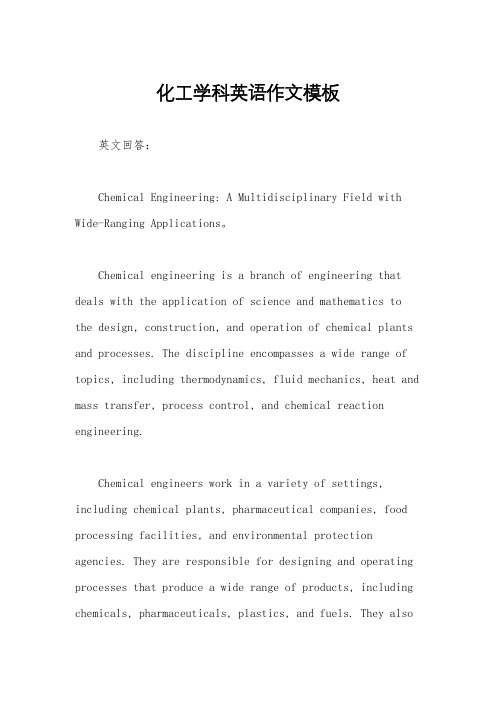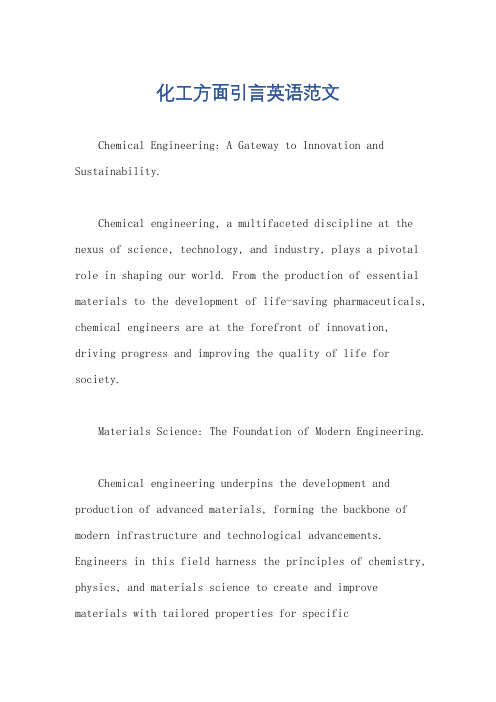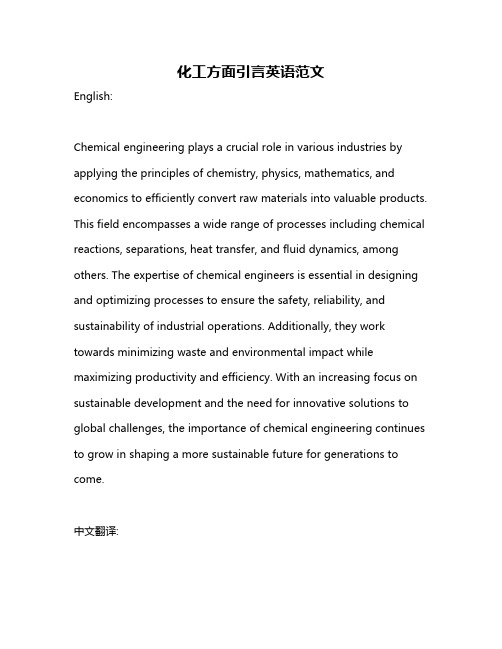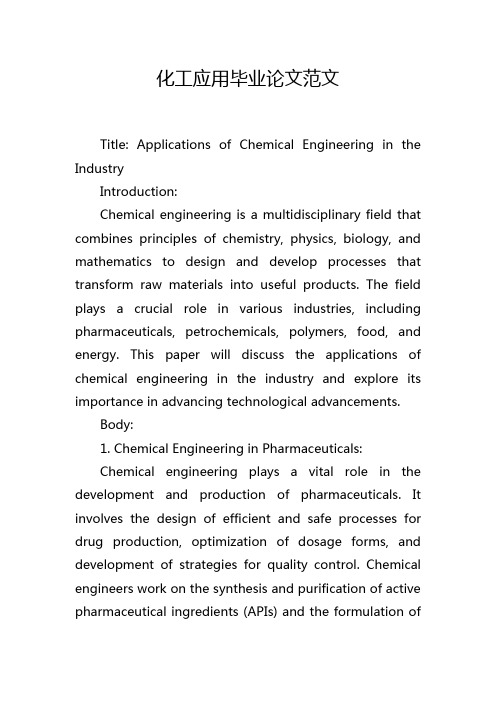化工英语论文20xx字
化工学科英语作文模板

化工学科英语作文模板英文回答:Chemical Engineering: A Multidisciplinary Field with Wide-Ranging Applications。
Chemical engineering is a branch of engineering that deals with the application of science and mathematics to the design, construction, and operation of chemical plants and processes. The discipline encompasses a wide range of topics, including thermodynamics, fluid mechanics, heat and mass transfer, process control, and chemical reaction engineering.Chemical engineers work in a variety of settings, including chemical plants, pharmaceutical companies, food processing facilities, and environmental protection agencies. They are responsible for designing and operating processes that produce a wide range of products, including chemicals, pharmaceuticals, plastics, and fuels. They alsowork to develop and improve processes that are more efficient, less polluting, and safer.Chemical engineering is a rapidly growing field, as the demand for chemicals and other products continues to increase. In addition, the need for sustainable and environmentally friendly processes is driving the development of new technologies and processes in the field.Key Features of Chemical Engineering。
化工方面引言英语范文

化工方面引言英语范文Chemical Engineering: A Gateway to Innovation and Sustainability.Chemical engineering, a multifaceted discipline at the nexus of science, technology, and industry, plays a pivotal role in shaping our world. From the production of essential materials to the development of life-saving pharmaceuticals, chemical engineers are at the forefront of innovation, driving progress and improving the quality of life for society.Materials Science: The Foundation of Modern Engineering.Chemical engineering underpins the development and production of advanced materials, forming the backbone of modern infrastructure and technological advancements. Engineers in this field harness the principles of chemistry, physics, and materials science to create and improve materials with tailored properties for specificapplications. From lightweight composites for aerospace engineering to biocompatible implants for medical devices, chemical engineers are pushing the boundaries of material science to meet the demands of the future.Energy Conversion and Storage: Addressing Global Challenges.With the growing global energy demand and the urgent need for sustainable solutions, chemical engineers are atthe forefront of developing efficient and environmentally friendly energy systems. They design and optimize processes for the conversion, transportation, and storage of energy, exploring renewable sources such as solar, wind, and biomass. By harnessing their expertise in thermodynamics, fluid mechanics, and electrochemistry, chemical engineers are contributing to the transition towards a cleaner and more sustainable energy future.Pharmaceuticals and Biotechnology: Improving Healthcare.Chemical engineers play a crucial role in thepharmaceutical and biotechnology industries, where they design and optimize processes for the production of life-saving drugs and therapies. Utilizing their knowledge of reaction kinetics, bioprocessing, and separation technologies, they develop efficient methods for manufacturing biologics, vaccines, and other essential healthcare products. Chemical engineers are also at the forefront of drug delivery research, devising innovative strategies for targeted and personalized treatments.Process Engineering: Optimizing Industrial Efficiency.Chemical engineers are responsible for designing, operating, and optimizing industrial processes, ensuring efficient and sustainable production of chemicals, fuels, and other essential products. They apply principles of mass and energy transfer, thermodynamics, and reaction engineering to develop and improve processes, minimizing waste, reducing energy consumption, and meeting environmental regulations. Process engineering is a key aspect of chemical engineering, enabling industries to operate efficiently while meeting the demands of a growingpopulation.Sustainability and Environmental Protection.Chemical engineers are acutely aware of the environmental impact of industrial activities and are committed to developing sustainable solutions. They design and implement processes that minimize pollution, reduce greenhouse gas emissions, and conserve natural resources. Chemical engineers are also involved in the development of renewable energy technologies, waste management systems, and other initiatives aimed at protecting the environment and ensuring a sustainable future.Education and Training: Preparing the Next Generation.The field of chemical engineering is constantly evolving, with the emergence of new technologies and the need to address global challenges. Chemical engineering education provides students with a strong foundation in the fundamental principles of chemistry, mathematics, physics, and engineering, equipping them with the knowledge andskills necessary to succeed in this dynamic field. Universities and institutions around the world offer undergraduate, graduate, and research programs in chemical engineering, preparing the next generation of engineers to drive innovation and shape the future of our world.Conclusion.Chemical engineering is an essential discipline that touches every aspect of modern life. Chemical engineers are innovators, problem-solvers, and guardians of the environment, harnessing their knowledge and skills to create solutions that improve the quality of life for society. As the world faces new challenges and opportunities, chemical engineers will undoubtedly continue to play a pivotal role in shaping our future.。
化工专业英语写作范文

化工专业英语写作范文Title: The Evolution and Importance of Chemical Engineering: A Global Perspective.Chemical engineering, often referred to as the "mother of all engineering disciplines," has played a pivotal role in the advancement of technology and industrialization. Its impact is felt across multiple sectors, including energy, healthcare, environmental protection, and more. In this article, we delve into the evolution of chemical engineering, its current significance, and its future prospects.Evolution of Chemical Engineering.The roots of chemical engineering can be traced back to the Industrial Revolution, when the need for efficient and sustainable production methods arose. Initially, the field was primarily focused on the optimization of processes in the chemical industry, such as the production offertilizers and dyes. However, as technology advanced, the scope of chemical engineering broadened to include areas like biochemistry, environmental engineering, and nanotechnology.One of the most significant milestones in the evolution of chemical engineering was the development of the principles of reaction engineering in the early 20th century. This marked a shift from a reliance on empirical methods to a more rigorous and systematic approach, based on the principles of physics and chemistry. This development laid the foundation for the design and optimization of chemical reactors, which are crucial in the production of various chemicals.Another key development was the integration of computers into chemical engineering in the later part of the 20th century. This integration enabled engineers to model and simulate complex chemical processes, thus predicting their behavior more accurately. Computer-aided design (CAD) and computer-aided manufacturing (CAM) tools also revolutionized the design and fabrication of chemicalplants, making the process more efficient and cost-effective.Current Significance of Chemical Engineering.Today, chemical engineering is at the forefront of addressing many of the world's most pressing challenges. For instance, it plays a crucial role in the development of sustainable energy solutions. Chemical engineers are involved in the research and development of efficient solar cells, batteries, and fuel cells, as well as in the optimization of biofuel production processes.In healthcare, chemical engineering has madesignificant contributions to the development of drugs and therapies. By manipulating molecules at the nanoscale, engineers are able to create targeted drugs that are more effective and have fewer side effects. They are also involved in the design of medical devices and the optimization of bioprocessing techniques for tissue engineering and regenerative medicine.Moreover, chemical engineering is essential in addressing environmental challenges. Engineers are working to develop more efficient waste treatment and recycling methods, as well as to mitigate the impact of industrial processes on the environment. They are also involved in the research and development of sustainable materials that can replace traditional, environmentally harmful ones.Future Prospects of Chemical Engineering.The future of chemical engineering looks bright, with numerous opportunities for innovation and growth. One area that is expected to witness significant advancements is biotechnology. With the advent of synthetic biology and genome editing tools like CRISPR-Cas9, chemical engineers will be able to design and engineer cells and organisms with enhanced functionalities. This could lead to the development of novel bioproducts, such as bioplastics and biofuels, that are more sustainable and environmentally friendly.Another area of potential growth is nanotechnology.Chemical engineers are exploring the use of nanomaterialsin various applications, including drug delivery, energy storage, and environmental remediation. The uniqueproperties of nanomaterials, such as their large surface area and enhanced reactivity, make them ideal foraddressing many of the challenges faced by the chemical industry.Lastly, the integration of digital technologies, suchas artificial intelligence (AI) and the Internet of Things (IoT), is expected to transform chemical engineering. These technologies can be used to optimize processes in real-time, predict and prevent failures, and improve safety and sustainability. By leveraging the power of data analytics and predictive modeling, chemical engineers will be able to make more informed decisions and develop more efficient and cost-effective processes.In conclusion, chemical engineering has come a long way since its inception and continues to play a pivotal role in addressing the world's most pressing challenges. As we look to the future, it is exciting to imagine the innovativesolutions that chemical engineers will develop and the impact they will have on society.。
化工方面引言英语范文

化工方面引言英语范文English:Chemical engineering plays a crucial role in various industries by applying the principles of chemistry, physics, mathematics, and economics to efficiently convert raw materials into valuable products. This field encompasses a wide range of processes including chemical reactions, separations, heat transfer, and fluid dynamics, among others. The expertise of chemical engineers is essential in designing and optimizing processes to ensure the safety, reliability, and sustainability of industrial operations. Additionally, they work towards minimizing waste and environmental impact while maximizing productivity and efficiency. With an increasing focus on sustainable development and the need for innovative solutions to global challenges, the importance of chemical engineering continues to grow in shaping a more sustainable future for generations to come.中文翻译:化学工程通过应用化学、物理、数学和经济学的原理,将原材料高效地转化为有价值的产品,在各个行业中发挥着至关重要的作用。
化工简介英文作文怎么写

化工简介英文作文怎么写英文,As a chemical engineering enthusiast, I'mthrilled to introduce this fascinating field both in English and Chinese. Let's dive in!Chemical engineering is a multidisciplinary branch of engineering that applies the principles of chemistry, physics, mathematics, and economics to efficiently use, produce, design, transport, and transform energy and materials. It's like being a magician who blends different ingredients to create something entirely new and useful.In chemical engineering, we deal with various processes such as chemical reactions, separation techniques, and process optimization. For instance, imagine you're making your favorite snack, potato chips. In chemical engineering terms, it involves slicing potatoes into thin pieces,frying them in oil, seasoning them with salt, and packaging them for distribution. Each step requires careful consideration of factors like temperature, pressure, andtime to ensure the final product is crispy and delicious.One of the most exciting aspects of chemicalengineering is its applications across different industries. From pharmaceuticals to food and beverage, from energy to environmental protection, chemical engineers play a crucial role in improving processes and developing innovative solutions. Take the production of clean energy, for example. Chemical engineers work on technologies like solar panels, fuel cells, and biofuels to reduce our reliance on fossil fuels and combat climate change.中文,作为一个化工爱好者,我很高兴能用英文和中文介绍这个迷人的领域。
化工新材料 英语作文模板

化工新材料英语作文模板Title: New Materials in Chemical Engineering。
In recent years, the field of chemical engineering has seen remarkable advancements in the development of new materials. These innovative materials have the potential to revolutionize various industries and play a crucial role in addressing global challenges such as environmental sustainability, energy efficiency, and healthcare. In this essay, we will explore the significance of new materials in chemical engineering and their impact on society.First and foremost, new materials in chemical engineering have the potential to enhance the efficiency and sustainability of industrial processes. For instance, the development of advanced catalysts and membranes has enabled the production of chemicals and fuels with higher selectivity and lower energy consumption. Additionally, the use of novel materials in separation technologies has led to significant improvements in the purification of water and air, thereby contributing to environmental protection and public health.Moreover, new materials have opened up new possibilities in the field of energy storage and conversion. The emergence of high-performance battery materials, such as lithium-sulfur and solid-state electrolytes, has the potential to revolutionize the energy storage industry. These materials offer higher energy density, faster charging rates, and longer cycle life, which are essential for the widespread adoption of electric vehicles and grid-scale energy storage. Furthermore, the development of advanced materials for solar cells and fuel cells has the potential to significantly increase the efficiency and reduce the cost of renewable energy technologies.In addition to their impact on industry and energy, new materials in chemical engineering are also playing a crucial role in advancing healthcare and biomedical applications. For example, the development of biocompatible and bioresorbable materials has enabled the design of innovative medical implants and drug delivery systems. These materials not only offer superior mechanical properties and biocompatibility but alsodegrade in the body over time, eliminating the need for surgical removal. Furthermore, the use of advanced biomaterials in tissue engineering and regenerative medicine has the potential to revolutionize the treatment of various medical conditions, including organ failure and tissue damage.Furthermore, the development of new materials in chemical engineering has the potential to address pressing environmental challenges, such as pollution and climate change. For example, the design of advanced materials for carbon capture and utilization has the potential to reduce greenhouse gas emissions from industrial processes and power plants. Additionally, the development of sustainable materials, such as biodegradable polymers and eco-friendly packaging, can help reduce the environmental impact of consumer products and waste.In conclusion, the development of new materials in chemical engineering holds great promise for addressing global challenges and improving the quality of life. These innovative materials have the potential to enhance the efficiency and sustainability of industrial processes, revolutionize the energy storage and conversion industry, advance healthcare and biomedical applications, and address pressing environmental challenges. As the field of chemical engineering continues to advance, it is essential to continue investing in research and development of new materials to unlock their full potential for the benefit of society.。
化工应用毕业论文范文

化工应用毕业论文范文Title: Applications of Chemical Engineering in the IndustryIntroduction:Chemical engineering is a multidisciplinary field that combines principles of chemistry, physics, biology, and mathematics to design and develop processes that transform raw materials into useful products. The field plays a crucial role in various industries, including pharmaceuticals, petrochemicals, polymers, food, and energy. This paper will discuss the applications of chemical engineering in the industry and explore its importance in advancing technological advancements.Body:1. Chemical Engineering in Pharmaceuticals:Chemical engineering plays a vital role in the development and production of pharmaceuticals. It involves the design of efficient and safe processes for drug production, optimization of dosage forms, and development of strategies for quality control. Chemical engineers work on the synthesis and purification of active pharmaceutical ingredients (APIs) and the formulation ofdrugs to ensure their effectiveness, stability, and safety. They also contribute to developing novel drug delivery systems, such as controlled-release formulations and targeted drug delivery.2. Chemical Engineering in Petrochemicals:Petrochemicals are chemicals derived from petroleum or natural gas and find applications in various industries, including plastics, rubber, textiles, and fertilizers. The role of chemical engineers in the petrochemical industry is essential in refining crude oil into different products, such as gasoline, diesel, and various chemicals. They design and optimize processes for separating and purifying different components of crude oil using techniques like distillation, fractional distillation, and cracking. Chemical engineers also develop new catalysts and processes to enhance efficiency and reduce energy consumption in petrochemical refining.3. Chemical Engineering in Polymers:Polymers are macromolecules composed of repeating units and find extensive applications in everyday products like plastics, rubber, textiles, and packaging materials. Chemical engineers contribute to the development and production of polymers bydesigning efficient polymerization processes, optimizing reaction conditions, and developing strategies for controlling molecular weight and polymer properties. They also work on the formulation of polymer blends and composites to enhance specific properties like strength, flexibility, and heat resistance. Chemical engineers play a crucial role in sustainability efforts by developing eco-friendly and biodegradable polymers.4. Chemical Engineering in Food:Chemical engineering plays a significant role in the food industry, primarily in the areas of food processing and preservation. Chemical engineers design processes for food production, such as baking, brewing, dairy processing, and vegetable oil extraction. They optimize processing conditions to ensure food safety, quality, and nutritional value. Additionally, chemical engineers work on the development and application of food additives, such as preservatives, emulsifiers, and flavor enhancers, to enhance the taste, texture, and shelf-life of food products.5. Chemical Engineering in Energy:Chemical engineers contribute to the energy sector by developing processes for the production, storage, and conversion of various forms of energy. They work on thedesign and optimization of fossil fuel-based power plants, renewable energy technologies like solar cells and wind turbines, and energy storage systems like batteries and fuel cells. Chemical engineers also work on carbon capture and storage technologies to mitigate greenhouse gas emissions and contribute to sustainable energy production.Conclusion:Chemical engineering plays a vital role in various industries, including pharmaceuticals, petrochemicals, polymers, food, and energy. It involves the design and optimization of processes for the production of valuable products, ensuring their safety, quality, and sustainability. The applications of chemical engineering in these industries contribute to technological advancements, economic growth, and the overall improvement of human life.。
学好化工专业英语作文

学好化工专业英语作文English:Studying chemical engineering requires a strong foundation in both the technical aspects of the field and the ability to effectively communicate that knowledge through writing. To excel in this major, one must not only master the scientific principles behind chemical processes and reactions, but also be able to convey these complex concepts in a clear and concise manner. Developing proficient English writing skills is essential for successfully completing assignments, reports, and research papers in the chemical engineering field. Additionally, being able to effectively communicate with colleagues, professors, and potential employers in written form is crucial for building professional relationships and advancing in the field. Therefore, honing one's skills in chemical engineering English writing is essential for achieving success in this competitive and rapidly-evolving industry.中文翻译:学习化工工程需要在领域的技术方面建立坚实的基础,同时通过书面表达有效地传达这些知识。
- 1、下载文档前请自行甄别文档内容的完整性,平台不提供额外的编辑、内容补充、找答案等附加服务。
- 2、"仅部分预览"的文档,不可在线预览部分如存在完整性等问题,可反馈申请退款(可完整预览的文档不适用该条件!)。
- 3、如文档侵犯您的权益,请联系客服反馈,我们会尽快为您处理(人工客服工作时间:9:00-18:30)。
化工英语论文20xx字篇一:英文文章总结无机材料金属辐射损伤阈值陶瓷辐射损伤阈值聚四氟乙烯(PTFE:聚四氟乙烯) 在只有100 Gy的辐射剂量下就会退化后,因此,聚四氟乙烯在辐射环境中是被禁止使用的;在接受辐照以后卤化聚合物和碳氟化合物)释放腐蚀性化学物质如HCl(盐酸)和HF(氟化氢)无机材料辐射对塑料的影响同时,涂层涂料还受到α粒子的影响,并且损伤比γ辐射更严重。
粘合剂的辐射损害弹性体:在总剂量小于10 kGy的条件下,辐射损害不太可能发生,同时,一些添加剂如胺类和酚类也可以使弹性体免受辐射的影响。
辐射对润滑油的影响玻璃窗口:远程可视化操作的内部通过一个很厚的含铅窗口吸收辐射射线。
窗口玻璃上的辐射损失相机镜头:加固后的CCD相机的耐辐射范围从100 Gy —10 kGy。
光学纤维:即使低剂量的辐照也会引起光钎的光学衰减,经测试,商用光纤已经退化到100 dB /公里/ Gy。
但是,当纤维的核心不包含任何掺杂物质时,,衰减就会大大降低,这对经常用于传输信号的红外波段的光是十分重要的。
这种抗辐射加固后的光纤可以暴露在1MGy的环境后只衰减0.1 dB/m。
电子及电子元器件真空管:由于真空管的容量和对功率要求使得它很少在电子工艺中使用,但是,它是在一个非常高剂量率的辐射环境中可以工作的器件,它可以承受的总剂量为1MGy,为了避免总剂量和剂量率的影响,许多抗辐照摄像机中都使用了真空管。
晶体:晶体是一种无源元件,用于控制振荡器的频率,由于含有杂质,它的频移与天然石英一样,只有总剂量为100 Gy时,,频率变化可以大于1 ppm。
对于某些应用程序, 有一个非常稳定的晶体频率可能对一个系统的可靠性是至关重要的,因此,最好使用人造石英晶体,这样,单位剂量下面的变化率可以低至KGy电阻器:辐射诱发化学材料降解导致电阻器电阻减小,大多数电阻器的抗辐照性能是比较好的,但是氧化膜电阻器在辐照剂量为10Gy时便会出现损伤。
电阻的辐射损伤阈值电容器:钽电容器能够显示因为电荷变化时所产生的辐射射引起的电导率和储存电荷,玻璃和陶瓷电容器最抗辐射,但只是限于小电容值。
篇二:化工行业标准英文版目录HG 20201-20xx 工程建设安装工程起重施工规范Specification for hoisting work of installation project of engineering constructionHG 20203-20xx 化工机器安装工程施工及验收通用规范General specification for installation and acceptance of chemical machinery HG 20236-93 化工设备安装工程质量检验评定标准Standard for inspection and evaluation of the quality of chemical equipment installationHG 20538-92 衬塑(PP、PE、PVC)钢管和管件HG 20580-1998 钢制化工容器设计基础规定 Specification for Design Base of Steel Chemical VesselsHG 20581-1998 钢制化工容器材料选用规定 Specification for Materials Selected of Steel Chemical VesselsHG 20582-1998 钢制化工容器强度计算规定 Specification for Stress Calculation of Steel Chemical VesselsHG 20583-1998 钢制化工容器结构设计规定Specification for Structural Design of Steel Chemical VesselsHG 20584-1998 钢制化工容器制造技术要求 Technical Requirements for Fabrication of Steel Chemical VesselsHG 20585-1998 钢制低温压力容器技术规定 Technial Specification for Steel Low Temperature Pressure VesselsHG 20592-20635-20xx 钢制管法兰、垫片、紧固件Steel pipe flanges,gaskets and boltingHG 20595-97 带颈对焊钢制管法兰 Steel pipe welding neck flangeHG 20611-1997 钢制管法兰用齿形组合垫 Tooth Profile Combined Gaskets for Steel Pipe FlangesHG 20660-20xx 压力容器中化学介质毒性危害和爆炸危险程度分类 The Grades of Toxicity Harm and Explosion Danger of Chemical in Pressured VesselsHG 20667-20xx 化工建设项目环境保护设计规定Provisions on engineering design of environmental protection of chemical industry projectsHG 21547-93 管道用钢制插板、垫环、8字盲板HG 2636-20xx 饲料级磷酸氢钙Feed grade calcium hydrogen pyrophosphate HG 2791-1996 食品添加剂二氧化硅 Food Addictive SiO2 HG/T 20505-20xx 过程测量与控制仪表的功能标志及图形符号 Functional identification and symbols for process measuring and controlling instrumentation HG/T 20507-20xx 自动化仪表选型设计规定 Design Code for selection ofInstrument typeHG/T 20508~20515-20xx 化工自控设计规定 Code of process controlling and measuring instrumentation for Chemical plantHG/T 20508-20xx 控制室设计规定 Design code for control roomHG/T 20509-20xx 仪表供电设计规定 Design code for instrument power supply systemHG/T 20510-20xx 仪表供气设计规定 Design code for instrument power air system HG/T 20511-20xx 信号报警、安全连锁系统设计规定 Design code for signal alarm and safety interlock systemHG/T 20512-20xx 仪表配管配线设计规定 Design code for instrument tubing andwiringHG/T 20513-20xx 仪表系统接地设计规定 Design code for instrument grounding HG/T 20514-20xx 仪表及管线伴热和绝热保温设计规定 Design code for tracing and insulation of instrument and pipingHG/T 20515-20xx 仪表隔离和吹洗设计规定 Design code for instrument seal and purgeHG/T 20516-20xx 自动分析器室设计规定 Design code for analyzer room HG/T 20551-1993 化工厂电力设计常用计算规定HG/T 20569-94 机械搅拌设备 Mechanical Agitating equipmentHG/T 20570.12-1995 工艺系统工程涉及技术规定HG/T 20573-95 分散型控制系统工程设计规定 Code for Distributed Control System Engineering DesignHG/T 20586-1996 化工企业照明设计技术规定 Technical regulation for lighting design in chemical enterprisesHG/T 20592-20xx 钢制管法兰HG/T 20592~20635-20xx 钢制管法兰、垫片、紧固件 Stee1 Pipe F1anges, Gaskets and BoltingHG/T 20606-20xx 钢制管法兰用非金属平垫片(PN 系列) 英文版“No n-meta11ic F1at Gaskets for use with Stee1 Pipe F1anges (PN Designated)Stee1 Pipe F1anges(PN Designated)”HG/T 20627-20xx 钢制管法兰用非金属平垫片(Class)系列 Non-metallic Flat Gaskets for Use with Steel Pipe Flanges(Class Designated)HG/T 20649-1998 化工企业总图运输设计规范 Design Code for General Plot Plan and Transportation of Chemical Industrial EnterprisesHG/T 20664-1999 化工企业供电设计技术规定 Specification of power supply design engineering for chemical enterprisesHG/T 20670-20xx 化工、石油化工管架、管墩设计规定 Specification fordesign of pipe supports and pipe pier in chemical and petrochemical industryHG/T 20675-1990 化工企业静电接地设计规程 Code for electrostatic grounding design of chemical industrial enterprisesHG/T 20677-1990 橡胶衬里化工设备 Chemical Processing Equipment of Rubber LiningHG/T 20679-90 化工设备管道外防腐设计规定HG/T 20681-20xx 锅炉房、汽机房土建荷载设计条件技术规定 Technical stipulation of civil-load requirements for the design of boiler and turbine house HG/T 20687-1989 化工企业爆炸和火灾危险环境电力设计规程 HG/T 20688-20xx 化工工厂初步设计文件内容深度规定 Specification on Content and Procedure of Preliminary Design File for Chemical Plant HG/T 20696-1999 玻璃钢化工设备设定规定Specification of FRP Equipment Design for Chemical IndustryHG/T 20699-20xx 自控设计常用名词术语General terminology for auto-control designHG/T 21514-20xx 钢制人孔和手孔HG/T 21517-20xx 回转盖带颈平焊法兰人孔HG/T 21520-20xx 垂直吊盖带颈平焊法兰人孔HG/T 21523-20xx 水平吊盖带颈平焊法兰人孔HG/T 21530-20xx 带颈平焊法兰手孔HG/T 2184-20xx 通用输水织物增强橡胶软管HG/T 3038_3039-20xx 岸上排吸油橡胶软管Rubber Hoses_On Shore Oil Suction and DischargeHG/T 3078-20xx 橡胶、塑料辊表面特性 Surface characteristics for Rubber-or plastics-covered rollersHG/T 3091-20xx 橡胶密封件给排水管及污水管道用接口密封圈材料规范Rubber Seals Joint Rings for Water supply, Drainage and Sewerage Pipelines Specification for MaterialsHG/T 3097-20xx 橡胶密封件110℃热水供应管道的管接口密封圈材料规范Rubber Seals Joint Rings for Pipelines for Hot Water supply up to 110℃ Specification for MaterialsHG/T 3099-20xx 建筑橡胶密封垫_预成型实心硫化的结构密封垫用材料规范 Rubber Building Gasket _ Materials for Preformed Solid Vulcanized Structural Gaskets _ SpecificationHG/T 3484-1999 化学试剂标准玻璃乳浊液和澄清度标准 Chemical reagent Standard of clear liquor, made from glass dust, and standard of transparenceHG/T 3492-20xx 工业氯化亚石风 Thionyl chloride for industrial use HG/T 3590-1999 制冷系统用分子筛干燥剂磨耗性能的试验方法 Test Method of Attrition of Molecular Sieve Desiccant Used in Refrigeration SystemHG/T 3687-20xx 工业硫氢化钠 Sodium hydrosulfide for industrial use HG/T 3788-20xx 工业氯化亚砜 Thionyl chloride for industrial use HG/T 3927-20xx 工业活性氧化铝Activated alumininium oxide for industrial use HGJ 203-206-92 化工机械安装工程施工及验收规范 Code for construction and acceptance of chemical machine installationHGJ 209-1983 中低压化工设备施工及验收规范 Code for construction and acceptance of middle and low-pressure chemical equipmentHGJ 211-85 化工塔类设备施工及验收规范 Code for construction and acceptance of chemical tower-type equipmentHGJ 229-91 工业设备、管道防腐蚀工程施工及验收规范 Construction and acceptance code for anticorrosion works for industrial equipment and pipelinesHGJ 231-91 化学工业在、中型装置试车工作规范 The work code for trial run of chemical industrial large and middle equipmentHJ 557-20xx 固体废物浸出毒性浸出方法水平振荡法Solid waste-Extraction procedure for leaching toxicity_Horizontal vibrationmethodHJ 77.1-20xx 水质二噁英类的测定同位素稀释高分辨气相色谱-高分辨质谱法Water Determination of polychlorinated dibenzo-p-dioxins(PCDDs)andpolychlorinated dibenzofurans(PCDFs)Isotope dilution HRGC-HRMSHJ/T 176-20xx 危险废物集中焚烧处置工程建设技术规范 TechnicalSpecifications for Centralized Incineration FacilityHJ/T 293-20xx 清洁生产标准汽车制造业(涂装) Cleaner production standardAutomobile manufacturing (Painting)HJ/T 314-20xx 清洁生产标准电镀行业 Cleaner protection standard Plating … surface finishing indust ryHJ/T 61-20xx 辐射环境监测技术规范 Technical criteria for radiation environmental monitoringHJ/T 75-20xx 固定污染源烟气排放连续监测技术规范 Specifications for continuous emissions monitoring of flue gas emitted from stationary sources (on trial) HJ/T 76-20xx 固定污染源烟气排放连续监测系统技术要求及检测方法Specification and test procedures for continuous emission monitoring systems of flue gas emitted from stationary sources (on trial)HJ/T 77-20xx 多氯代二苯并二恶英和多氯代二苯并呋喃的测定同位素稀释高分辨毛细管气相色谱_高分辨质谱法 Determination of polychlorinateddibenzo-p-dioxins and polychlorinated dibenzo-p-furans by isotope dilutionHRGC/HRMS篇三:化工安全专业毕业论文 -参考初稿化工企业安全现状评价XXX安全技术管理毕业论文XXX【摘要】XX公司是XX子公司,具体负责项目的实施。
